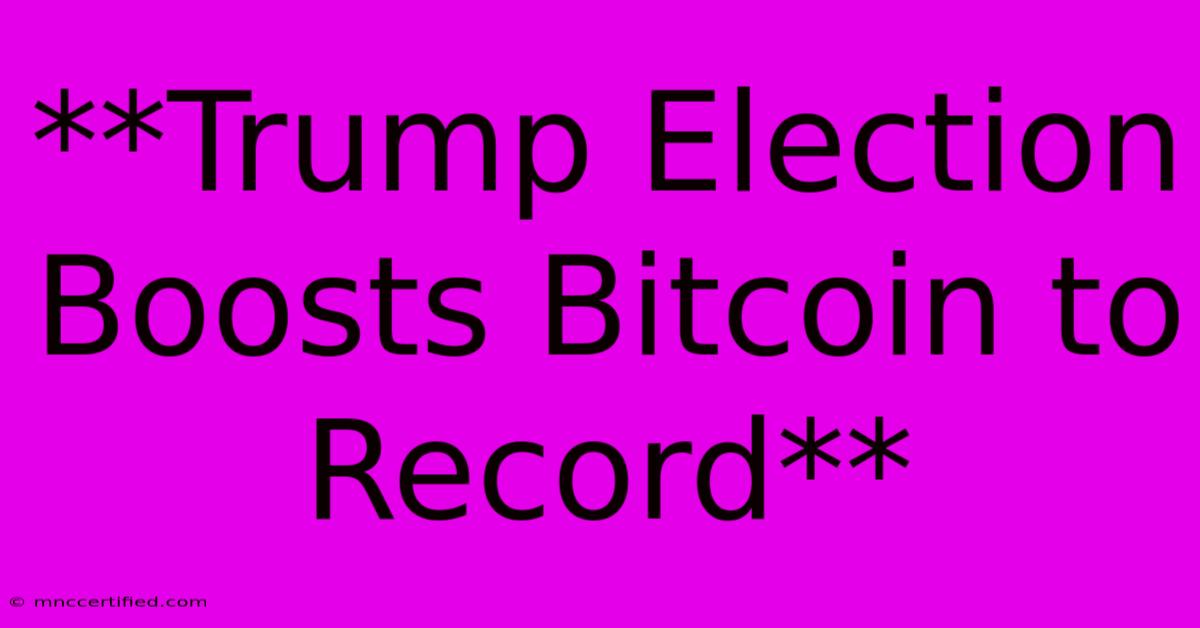**Trump Election Boosts Bitcoin To Record**

Table of Contents
Trump Election Boosts Bitcoin to Record: A Look Back at a Historic Moment
The 2016 US presidential election wasn't just a turning point in American politics; it also had a dramatic impact on the world of cryptocurrency, particularly Bitcoin. In the aftermath of Donald Trump's victory, Bitcoin surged to a record high, sparking a wave of interest and speculation that continues to shape the cryptocurrency landscape today.
The Unexpected Rise of Bitcoin: A Correlation or Causation?
On November 8th, 2016, as the world watched in disbelief, Trump's election victory was announced. Almost immediately, Bitcoin began its ascent, breaking through the $700 mark and reaching a then-unprecedented high of over $770. This dramatic rise fueled speculation about a connection between the election and Bitcoin's growth.
While no direct causal link has been definitively proven, several theories emerged:
- Safe Haven Asset: Some analysts argued that investors, seeking refuge from potential political and economic instability following Trump's victory, turned to Bitcoin as a safe haven asset. Bitcoin's decentralized nature and limited supply made it an attractive alternative to traditional financial markets.
- Increased Interest: Trump's election also generated renewed interest in Bitcoin. His unexpected win, along with his unconventional policies, triggered a surge in media coverage, which in turn attracted new investors and fueled a broader awareness of cryptocurrency.
- Technological Advancements: The rise of Bitcoin around this time coincided with significant technological advancements in the cryptocurrency ecosystem, including the increasing popularity of Bitcoin exchanges and the development of new tools for trading and investing.
The Aftermath: A Lasting Impact
The 2016 Trump election marked a turning point for Bitcoin, solidifying its position as a legitimate asset class and signaling its growing influence on the global financial landscape. The event:
- Boosted Global Awareness: The election's impact on Bitcoin brought cryptocurrency to the forefront of public consciousness. News outlets and financial institutions began paying more attention to Bitcoin, increasing its visibility and raising broader awareness about the technology.
- Fueled Market Growth: The surge in Bitcoin's value after the election attracted a flood of new investors, both individual and institutional. This influx of capital fueled further price increases and spurred a wave of innovation and investment within the cryptocurrency space.
- Accelerated Regulation: The increased attention on Bitcoin also prompted regulatory bodies around the world to take a more proactive approach to the cryptocurrency sector. Governments and central banks began exploring the potential benefits and risks associated with cryptocurrencies, laying the groundwork for future policy development.
Looking Forward: Lessons Learned
The connection between the 2016 Trump election and the rise of Bitcoin is a fascinating case study in the interplay between politics, technology, and finance. While the exact nature of the correlation remains debated, it's clear that the event had a profound impact on the trajectory of Bitcoin's growth.
The story of Bitcoin's surge in the wake of the Trump election highlights the following key takeaways:
- Political Uncertainty Can Drive Cryptocurrency Demand: The rise of Bitcoin as a safe haven asset during periods of political uncertainty demonstrates the potential for cryptocurrency to become a significant part of investment portfolios.
- Increased Media Attention Drives Growth: The more exposure cryptocurrency receives, the more likely it is to attract new investors and drive price increases.
- Regulation Remains Crucial: The increasing attention on Bitcoin also underscores the need for robust regulation to foster responsible development and investor protection within the cryptocurrency ecosystem.
The story of Bitcoin's rise in the wake of the Trump election serves as a reminder of the dynamic and evolving nature of the cryptocurrency space. As we move forward, it is critical to learn from the past and understand how political and economic events can influence the future of this rapidly growing industry.

Thank you for visiting our website wich cover about **Trump Election Boosts Bitcoin To Record** . We hope the information provided has been useful to you. Feel free to contact us if you have any questions or need further assistance. See you next time and dont miss to bookmark.
Featured Posts
-
Champions League Delay Bayern Vs Benfica
Nov 07, 2024
-
Online Subutex Doctors That Take Insurance
Nov 07, 2024
-
Tesla Stock Jumps 14 On Trump Victory
Nov 07, 2024
-
Trumps Party Wins Senate What Now
Nov 07, 2024
-
Increased Security At Boardmasters Newquay 2025
Nov 07, 2024